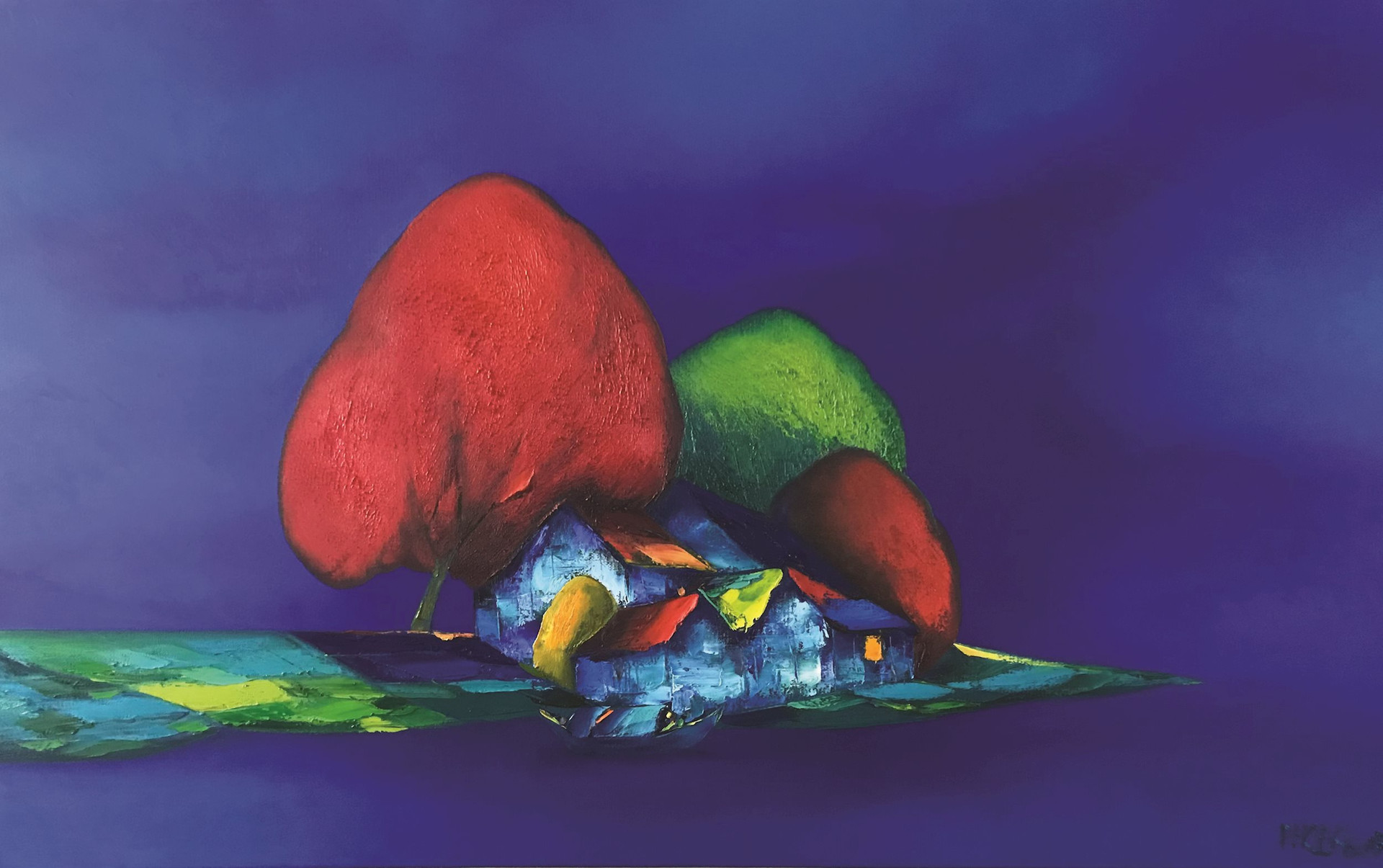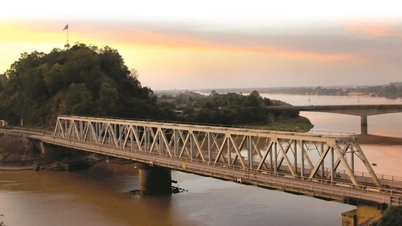
As Tet approaches the village, gusts of wind and rain blow along the road that hugs the river. The village, lush and green all year round, encircles the river as if wanting to intertwine with the gentle mother water. Vietnamese villages, whether in the plains or the semi-mountainous regions, have traditionally been structured around riverbanks, embracing each other.
Perhaps it's because water is the source of life. And in the past, rivers also played a role in waterway transportation. Wherever there are people and villages, there are fields, rivers, and lakes. Rivers are the lifeblood, silently holding the life of the inhabitants, nurturing the vibrant green of the villages.
The first river whose cool waters I ever touched was a beautiful branch of the Vinh Giang River, flowing between my hometown villages of Dong Thanh and Thanh Khe.
Reflected in the river's waters, the green villages on both sides embrace each other with deep affection. The small river is so endearing that a single pole stretched across could sometimes touch both banks. The greatest joy is hearing voices echoing from one bank to the other, calling each other to wake up early, help pick some water spinach, and get ready for the market. Calling each other over some sweet, ripe guavas or the first ripe fruits of the season…
Those names, though slightly dirty, were warm and resonant. Calling out one person's name could be heard throughout the entire village. Calling out one person's name could stir the river's surface, the water lilies would tremble with joy, and a few small fish would playfully wriggle…
On a clear autumn afternoon, with white clouds in the sky, the water hyacinths swayed gently, like the long, flowing hair of a fairy. I often went to the river, sometimes to look for water hyacinths, sometimes to pick sweet potato leaves, and sometimes to do laundry. In the innocent joy of childhood with the river, there was the pleasure of bathing and playing with tiny water mites, no bigger than a toothpick head. They swam swiftly, circling around my feet without any fear. Occasionally, among them were a few minnows, catfish, and other small fish. But these were clever and cautious, only leaping up briefly to see if there was anything to eat before quickly diving back down to feed.
I've always thought of the river as a clear mirror, reflecting the lives of many. The village by the river, the trees leaning affectionately towards it.
Back in my day, I was covered in dirt and grime from playing with fish, shrimp, in rivers, lakes, and rice paddies. So later, when I left my hometown, remembering the river was like remembering my entire childhood and youth. Crabs scurrying about. A few tiny fish roe perched precariously on the stems of water spinach. Some small frogs hiding in the purple water hyacinths suddenly leaping up to snatch a dragonfly.
In the afternoon, the kids would grab a rusty tin can containing a few wriggling hibiscus caterpillars, and a hookless fishing rod, and head to the river to lure the flagtail fish. They'd simply tie the caterpillar to the end of a string and bob it up and down on the water's surface. Suddenly, a few shimmering, colorful flagtail fish, eager to eat, would dart out from the water lily roots, quickly bite the hook, and be pulled up, hopping around on the muddy road. Each kid would catch about ten fish, then they'd all go for a swim and paddle around.
The river suddenly murmured, rippled, and burst into bursts of laughter. The river transformed into a vibrant, ever-changing performance space of childhood. As we grew older, the river also widened and rejoiced, offering our youth a sky of dreams and tenderness. The two friends who once gathered vegetables and weeds together, after seven or eight years, grew up, and those memories of their youthful camaraderie became treasures of their youth, allowing young men and women to reminisce about moonlit nights on the bridge spanning the river, near the majestic double-branched rice plant, where they eventually became husband and wife...
The two villages, sharing a common river, shared a close bond that lasted for generations. Countless wedding processions crossed the bridge, resulting in the establishment of many new families and a large, prosperous community. Many became relatives, both paternal and maternal, and even those without family ties still shared a close connection.
The village bustled with activity, receiving and distributing goods, with adults reminding children of proper etiquette. That's why the villagers were so close-knit, living innocently, getting dirty with the land, sharing every stalk of sugarcane, sweet potato, handful of tea, and cassava root. Grapefruit, bunches of bananas, and oranges were given as gifts for the New Year's fruit platter. All it took was going to the riverbank, calling out to the other side to ask someone to come and collect. And then, the sound of laughter echoed brightly across the river…
But now, that same river, polluted by domestic wastewater and industrial sewage flowing from the city's outskirts, is no longer clean, its waters devoid of algae, and the sounds of laughter have gradually faded. The fairy with her seaweed-like hair, the water mites, the flag-waving fish—they are now just shadows, hidden in the memories of my childhood. I always feel a pang of nostalgia for the rivers, especially when Tet (Lunar New Year) approaches. Because I know that as soon as I reach the edge of the village, the river will be there, faithfully waiting…
The small river, once more vast than the boundless fields where egrets flew, providing abundant harvests in the past, has now become a city and a factory. The longing for the old river sometimes feels like the weariness of my dry, rough footsteps on today's concrete road. Perhaps, the entire field, as seen through the eyes of my childhood, has become too vast, sometimes hazy and distant.
The fields are filled with the love and care of our mothers and sisters, because they have toiled the hardest throughout their lives, working with rice, corn, shrimp, and fish in those fields, so that we could be loved, embraced, comforted, and have the most fun playing by the rivers.
I've always thought of the river as a clear mirror, reflecting the lives of countless people. The village by the river, its trees leaning affectionately towards it. The shadows of people crossing the river, the bamboo bridge trembling with each rhythmic step. In the mirror-like waters of the river, countless people, countless destinies, have bathed their lives there, grown up nourished by the sweet, clean water of the river. Traveling downstream from Dong Thanh, Thanh Khe, through Xom Trai, the people of Dong-Khe-Trai village today remain connected to modern life – cars parked outside their gates, tap water reaching their kitchens – and the small Vinh Giang river. Years ago, they would fetch buckets of cool water each day, carefully catch fish and shrimp, and nurture their vegetables and sweet potato shoots, cherishing them for a warm and comforting evening meal.
Now, the river is no longer clean, and the water hyacinths have vanished. A life of countless creatures that once flourished, thrived, and passionately flowed along that river has completely disappeared. Looking at the cold, gray concrete banks and the indifferent sewage pipes, one cannot help but feel bewildered, regretful, and sorrowful. Sometimes, one longs to do something immediately to reclaim the verdant river of childhood, of youth, until the day one's hair turns gray and reflects in its water...
I mourn a river that still embraces the lives of so many villagers day and night, but is no longer gentle, clear, and flowing. I remember the river that silently flowed through the hardships and love of our parents; flowing through our childhood and youth, shimmering with a realm of childhood memories; nurturing and cultivating so many dreams and aspirations.
A gentle river carried our childhood memories downstream to the fields, merging with the Mother River, easing the hardships of our mothers, sisters, and the people of our homeland through countless bitter and sweet experiences. And then, growing up, far from home, we still yearn to "go towards the river," to "gaze our reflections in the river's waters"...
Source





![[Photo] Prime Minister Pham Minh Chinh presides over a meeting to assess the situation during the Lunar New Year holiday.](https://vphoto.vietnam.vn/thumb/1200x675/vietnam/resource/IMAGE/2026/02/22/1771768925196_ndo_br_dsc-6283-jpg.webp)













































































































Comment (0)